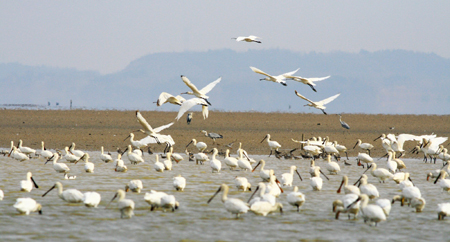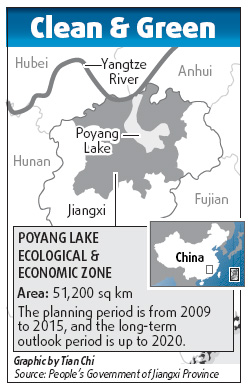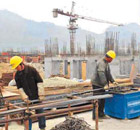Top Biz News
Lake zone to be 'green' model
By Xin Dingding (China Daily)
Updated: 2010-01-29 07:51
 |
Large Medium Small |
 |
|
A flock of egrets search for food in Poyang Lake in Hukou county, Jiangxi province, on Nov 14, 2009. [China Daily] |
The area surrounding China's largest freshwater lake is being turned into a national experimental field for low-carbon economy development, a top official said yesterday.
The Poyang Lake eco-economic zone in east China's Jiangxi province will become a model to show that robust economic growth can be achieved without sacrificing the environment, Governor Wu Xinxiong said at a press conference.
The 51,200-sq-km zone, bigger than the size of Switzerland, is home to a population of 20 million in 38 cities and counties, including the provincial capital Nanchang.
According to the plan, development and construction will be "totally forbidden" in the 5,181-sq-m core region, and "strictly controlled" in the 3,700-sq-km belt along the lake. The remaining area will be "intensively explored".

The zone will focus on 10 industries, including photo voltaic materials, wind and nuclear power, clean automobile and power cell, and aerospace manufacturing.
"Foreign and social investments are welcome," said Yao Mugen, director of Jiangxi provincial development and reform commission.
"We will firmly say 'no' to energy-consuming and polluting industries to protect Poyang Lake," Governor Wu said.
Of the four largest lakes in the country, Poyang Lake is the only non-eutrophic body of water.
However, Ma Jun, director of the Beijing-based Institute of Public and Environmental Affairs, a non-governmental organization, said the lake is facing threats of pollution and receding water levels.
"Despite strict controls, the lake may still witness pollution, as pollutants could run into the water body through its five tributaries. Some of the rivers extend out of the eco zone," Ma said.
According to media reports, the water in the lake has been decreasing since 2005, with longer periods of winter drought. Last October, the lake witnessed a drought 40 days ahead of usual. The water quality has also deteriorated due to pollution, compared to two decades ago.
Governor Wu said measures have been adopted to ban mining and all polluting factories have been asked to move out of the five rivers' source regions. "In addition, laws will be drafted to increase people's awareness and environmental protection policies will be part of the evaluation of city and county-level officials," he added.
But the activists' main concern is the implementation of the plan.
"As western China is currently witnessing an industrial transfer from the eastern part of the country in the economic overhaul, the impulse for development in the western region should not be underestimated," he said.













